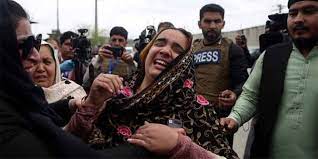Kabul. When Kabul fell to the Taliban in 2021, there were concerns that some of Afghanistan’s small non-Muslim minority might disappear. A media report states that after two years, these apprehensions are proving to be correct. Afghanistan’s last Jew fled the country soon after the Taliban took over, leaving the Sikh and Hindu communities believed to be reduced to only a handful of families. Sikhs and Hindus (Hindu-Sikhs) are facing severe restrictions under Taliban rule. There is a ban on celebrating their religious programs in public, which has left many people with no option but to flee from there.
“I can’t go anywhere freely,” said Fari Kaur, one of the last Sikhs left in the capital Kabul. “When I go out, I have to dress like a Muslim,” she said, referring to Taliban orders. Forced so that I cannot be identified as a Sikh.’ Kaur’s father was killed in 2018 in a suicide attack targeting Sikhs and Hindus in the eastern city of Jalalabad. The attack reportedly caused 1,500 Sikhs to leave the country, including Kaur’s mother and sisters.
But Kaur refused to leave and stayed in Kabul. In March 2020, 25 people died when Islamic State-Khorasan (IS-K) terrorists attacked a Sikh temple in Kabul. After the attack, most of the remaining members of the minority community left Afghanistan. Still Kaur refused to leave. But now, two years after the Taliban seized power, he said the lack of religious freedom left him with no choice but to seek refuge abroad.
He said, “We have not celebrated our major festivals since the Taliban returned to power. There are very few members of our community left in Afghanistan. We can’t even take care of our temples.’ In the 1980s, there were 100,000 Hindus and Sikhs in Afghanistan. But the war that broke out in 1979 and the beginning of increasing persecution forced many people to leave the country. During the civil war of the 1990s, the Taliban and rival Islamic groups pledged to protect minorities. But many Sikhs and Hindus lost their homes and businesses and fled to India.
When the Taliban took power in August 2021, it tried to allay the fears of non-Muslim Afghans. But the Taliban’s harsh restrictions on Sikhs and Hindus have forced many to seek a way out of their homeland, RFE/RL reports. Niyala Mohammad, director of policy and strategy at the non-profit Muslim Public Affairs Council in Washington, said the situation for religious minorities in Afghanistan, including Hindu, Sikh, Baha’i, Christian, Ahmadi and Shia Muslims, has deteriorated rapidly under Taliban rule.
“The situation continues to worsen as political extremist groups such as the Taliban rise to power in the region, claiming to represent Islam,” said Mohammad, who was the first South Asia analyst for the US Commission on International Religious Freedom. has left a huge void in the social fabric of the country.
 Indian Thought Latest News & Views
Indian Thought Latest News & Views



